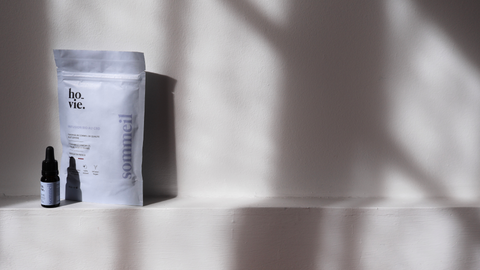Free delivery in mainland France for purchases over €50
Sleep disorders

Sleep is essential to our well-being; it affects not only our physical and mental health, but also our cognitive performance. Today, many people suffer from sleep disorders that prevent them from getting restful rest. During sleep, our body regenerates, so quality sleep is essential for maintaining a strong immune system and overall good health.
What are the main sleep disorders?
Sleep disorders are disorders that disrupt the quantity and/or quality of a person's sleep . They can affect falling asleep , staying asleep , the quality of sleep , or waking up and are caused by various factors such as stress , anxiety , bad habits , an unsuitable environment , or other psychological disorders .
Some of the most common sleep disorders include:
- Sleep apnea:
- Narcolepsy:
- Parasomnias:
- Restless Legs Syndrome:
- Circadian rhythm shift:
- Insomnia:
Insomnia is one of the most common sleep disorders and is characterized by difficulty falling or staying asleep , which can lead to excessive daytime fatigue . These difficulties can be the result of several factors, including stress , anxiety , depression , irregular sleep patterns , underlying medical conditions , or excessive consumption of stimulants such as caffeine or screens. Environmental factors such as an unsuitable bedroom, light, noise, or temperature can also contribute to insomnia. In addition, its impact on well-being and health can be considerable . Indeed, it can lead to significant irritability , decreased concentration and memory , an increased risk of accidents , and a deterioration in mental health . In the long term, it can cause an increased risk of developing chronic health problems such as high blood pressure, heart disease, and diabetes. Therefore, we can consider that the treatment of insomnia is absolutely essential .
What are the symptoms of sleep disorders?
Sleep disorders manifest themselves through different symptoms:
- Difficulty falling asleep
- Frequent awakenings during the night
- Unrestful sleep
- Excessive daytime sleepiness
- Irritability and difficulty concentrating
All of these symptoms can have a real impact on our well-being.
What can cause sleep disturbances?
Many factors can be responsible for sleep disorders , so it is essential to understand them in order to find suitable solutions to improve the quality of sleep . Stress and anxiety are among them, they can make it difficult to fall asleep. As for irregular sleep patterns, they disrupt the natural rhythm of sleep . In addition, medical conditions such as sleep apnea can interfere with sleep . Certain medications and substances like caffeine and alcohol can also have a harmful impact.
What are the consequences of a lack of sleep?
Lack of sleep can have negative consequences on both physical and mental health. There is an increased risk of heart problems , obesity, and a weakened immune system. Mentally, lack of sleep can contribute to anxiety , depression , and mood disorders . In addition, insufficient sleep can lead to decreased concentration and memory .
Treatments for sleep disorders
Sleeping pills and side effects
Although sleeping pills can be effective in treating sleep disorders , they can also have unwanted side effects such as the risk of addiction , dependency , nervous system disorders, as well as confusion and the risk of falls, especially in older adults. This is why many people are looking for natural alternatives.
Natural alternatives with CBD
More and more people are turning to natural treatments to relieve sleep disorders. Among them, relaxation and meditation : by reducing stress , you will promote deeper and more restorative sleep cycles . In addition, the use of plants like chamomile can facilitate falling asleep and improve the depth of sleep. In recent years, CBD products without THC have also gained popularity among the natural solutions that exist. Indeed, several studies show that CBD without THC has promising potential to treat sleep disorders . CBD is an active compound present in the hemp plant, it does not cause psychotropic effects, therefore no feeling of euphoria or altered consciousness, unlike THC . CBD without THC is studied for its relaxing , anxiolytic and analgesic properties which could thus help improve the quality of sleep . This is because it interacts with the body's endocannabinoid system, which plays a major role in regulating physiological processes such as sleep . By combining its properties with other natural approaches, as our products do, it is possible to improve sleep without the side effects of traditional sleeping pills.
Sleeping pills can cause episodes of confusion , especially in the elderly or at high doses, manifesting as disorientation and impaired clarity of thought .


